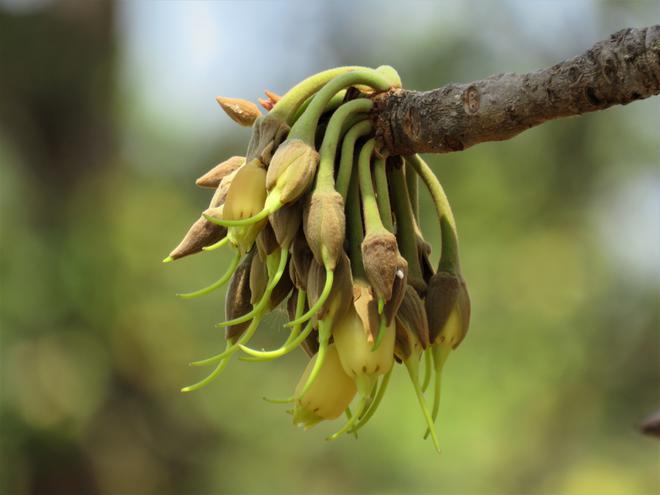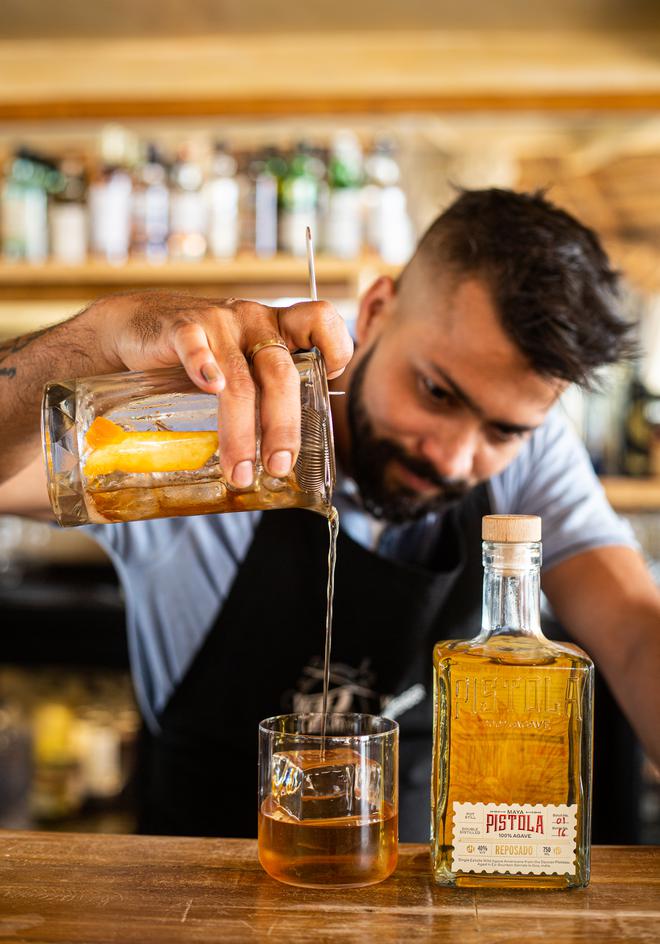How does a spirit distinguish itself as uniquely Indian? Is it the provenance of its ingredients, its origin story, or a marriage of both?
How does a spirit distinguish itself as uniquely Indian? Is it the provenance of its ingredients, its origin story, or a marriage of both?
With Indian consumers eager to experiment with their tipple, homegrown brews are finding their way onto hipster bars, in a market flush with inventive Indian gins and whiskey. Feni from Goa, agave spirits born from produce in the Deccan plateau, and mahua from the central Indian heartland, offer a truly Indian experience.
Ode to the sun and sand
Feni conjures memories of Goan holidays: The beach, recheado-spiced seafood and the heady aroma of cashew and coconut woven with fresh citrus. Feni, the first homegrown spirit to earn a Geographical Indication tag (GI is an indication used to identify goods having special characteristics originating from a definite geographical territory, specifically used in agriculture, natural and manufactured items) is now a heritage spirit of Goa, at par with international liquors such as Mexican tequila, Japanese sake and Russian vodka.
Hansel Vaz, founder, Cazulo Premium Feni at Vaz Liquor Industries, has been the torchbearer for the Goan spirit, since taking over his family business, started in the 1970s. A geologist by profession, Vaz now spends his time elevating the experience at his distilleries in South Goa, while documenting the drink’s unique story as a feni ethnographer, recently submitting paperwork to get coconut feni its own GI tag.
“In the 1990s, with a boom in tourism, there was a deluge of feni in the market and often, the essence of the spirit was lost as sales increased. Feni, both cashew and coconut, have been crafted on our shores, in small batches, for over four centuries, and we use the same techniques as they did back then,” Vaz says. For the cashew feni, cashew apples that fall to the ground are stomped on in a stone pit, fermented naturally in earthen pots half-buried in the ground. The coconut varietal boasts of hand-harvested sweet coconut toddy, allowed to further ferment by encouraging the use of naturally occurring wild tropical yeasts.
“In 2019, I started distillery tours that gained momentum by word of mouth. At our tasting, we sit together and taste feni in its many iterations with a smorgasbord of 23 local delicacies including Goan sausage and perad (guava cheese). Our 200-year-old distillery — Fazenda Cazulo — still uses pre-industrial processes,” adds Hanzel.
Bottled at a high 42.8% ABV (alcohol by volume is a standard measure of how much alcohol is contained in a given volume of an alcoholic beverage), the cashew feni sells at ₹600 for a 750ml bottle, while the botanical Dukshiri variant is priced at ₹1,000 per bottle. “I think gin, with its focus on botanicals, has paved the way for Indians to appreciate feni. Our Dukshiri is coconut feni made with the Indian sarsaparilla root; the drink has an earthy flavour with notes of petrichor, peanut and salted caramel.”
2022 is looking up as Hansel is ready to launch in Mumbai, creating a distil your own feni project as well as an initiative to plant more cashew trees within Goa with every case sold.
Indian agave spirit steps up to the bar
From Goa to the East coast, there has been a spirit renaissance with a fortuitous crop brought to Indian shores by explorers centuries ago. Agave Americana, then served as great fencing material especially along Railway lines, is now making a 21st Century comeback.
The plants, like their counterparts in Mexico, require little rainfall and thrived in the volcanic, arid soil of India’s Deccan plateau. It wasn’t until the early 2000s that locals were made aware of the spirit that can be distilled from the heart, or piña, of the agave plant.
Desmond Nazareth, armed with a degree from IIT Madras and stints in software and filmmaking, followed his maverick spirit to create India’s first agave-based alcohol. In April 2011, Desmondjis , Nazareth’s Goa-based company, introduced India’s first agave spirit in two iterations – 51% (₹495 per bottle) and 100% agave (₹850 per bottle).
The white spirit, made from the Agave americana plants grown over 44 acres in the Deccan plateau near Chittoor at the border between Andhra Pradesh and Karnataka, is harvested by locals. Desmondjis Agave spirit is sold in Goa, parts of Maharashtra, Telangana, Daman and Assam, but it wasn’t until the pandemic hit that demand suddenly shot through the roof. Desmond explains, “We saw this surge for agave-based alcohol and were happy to hand over our distilled spirit to entrepreneurs willing to make it a premium product. The Indian variant of the agave plant lends its own tasting notes from the terroir, that offers a completely Indian spirit. We have co-branded our product in Europe, with a Danish partner.”

A mahua tree
| Photo Credit: SPECIAL ARRANGEMENT
In Goa, Rakshay and Radhika Dhariwal of Pass Code Spirits, an offshoot of Passcode Hospitality, have taken the agave story forward with Pistola, a completely Indian agave spirit, grown in Chittoor, on the border of Andhra Pradesh and Karnataka.
The agave grows for eight to 10 years before it is harvested, then steamed in an autoclave, followed by bio-fermentation and double-distillation in a half copper pot still. The distillate has a strength of 55% ABV. The first variant — the Reposado, has just hit the Goan market (₹2,695 for 750 ml) and there are imminent launches in Delhi (₹3,000) and Mumbai (₹4,500) to follow. The Reposado (meaning rested), is aged for five months in virgin American white oak and ex-Bourbon casks in Goa.
“We have the raw materials growing in profusion in our backyard, so I thought why not attempt to make a top class, quality product that we can serve at our outposts?,” says Rakshay. Battling a tragic fire that hit the distillery at the end of 2021, Rakshay is now looking to quadruple capacity at the distillery by adding 10 new American and ex-Bourbon barrels.
Taking mahua to the masses
While agave may be the new kid on the block, mahua-based spirits have been brewed by tribes across the breadth of central India.
The pale yellow flowering tree offers food, fuel and fodder to tribal people, who have drunk the first distillate of the mahua flower for centuries. Desmond, while setting his agave spirits on the backburner, grew curious of the floral and nuanced notes of the mahua-based spirit he sampled.
“Millions of tribal people in India across 13 states call it the kalpvriksha, since it has yielded even during times of drought. Over 500 million flowers are collected annually by tribes, then sold to middlemen for a song, and then bought back by tribes after a quarter at much higher prices. The tribes have lacked hygienic storage facilities so they could not process the flowers without intervention,” adds Desmond. In November 2021, Madhya Pradesh announced mahua would be considered a heritage liquor and the State would allow tribals to brew and sell it using their indigenous methods.
“This is a huge shot in the arm to the tribals who have harboured the recipes for centuries,” says Desmond, who has visited tribal settlements in Bastar, done recce trips across central India with economist Jean Drèze and his wife Bela Bhatia, and visited swathes of Yavatmal in Maharashtra, looking for the best way to bring mahua to the masses. Desmondjis has tried to work with governments in Central India to set up mahua banks, where collected mahua can be stored at nominal rates. “We reached out to tribes to collect the flowers for us, by ensconcing the tree trunk with nets, so the falling flowers retain their nectar, which is often lost when it falls to the ground. Now local Government agencies across Odisha, Jharkhand, Chhattisgarh and Madhya Pradesh have educated tribes about specific food grade mahua and optimal methods for collection and drying.”

Agave spirit aged in ex-Bourbon
barrels
| Photo Credit: SPECIAL ARRANGEMENT
While tribes consume the first distillate, which is earthy and heady, at Desmondji’s microbrewery, mahua flowers collected by tribal groups are mixed with water and yeast in pot stills especially designed for the mahua spirit. The spirit goes through multiple rounds of distillation and a spice bouquet of cardamom, cinnamon, cloves and multi-floral honey is added to it. “We currently retail in Karnataka (₹2,030) and Goa (₹675), both at 40% ABV. We are in talks with governments to submit paperwork for a GI tag for mahua liquor, so tribals across the Indian heartland can make and sell this heritage spirit. This is the ultimate goal as we try to bring mahua to the mainstream,” explains Desmond, adding,” We are looking at a crowdfunded equity plan to take mahua spirit to the USA and the UK, hoping the diaspora is keen to bring truly Indian spirits to bars across the world.”
Off to the tropics
A pina colada instantly transports you to the sun and sand. And that’s exactly where India gets its popular coconut liqueur, Cabo. Born in the vacuum left by Malibu rum, when it exited Goan bars back in 2006, Cabo is the most sought after souvenir of tourists visiting the State. Solomon Diniz who heads Goa-based Adinco Distilleries, a family-owned business says, “We use coconuts from the tropics, and the liqueur is perfect as a sipping spirit, on the rocks, in a cocktail or with a mixer.” The coconut-shaped white bottle retails at ₹675 in Goa and ₹2,050 in Maharashtra.
Adinco also creates a coffee based spirit, Ti Connie — a mix of Coorg coffee and arabica varietals from Brazil with notes of caramel and a shot of Adinco’s rum, as well as its own take on the orange liqueur triple sec, Ti Connie Triple Sec, made with dried peels of bitter and sweet Nagpur oranges. “In a blind taste test, bartenders couldn’t tell the difference between our liqueur and triple sec, and now we are popular across Goan bars since we offer a quality product at a competitive price point of ₹650,” says Solomon.
























